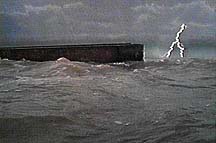As a family, we do eat yummy jellybeans and the other candies and goodies offered at this time of year. My dad buys plastic eggs with candy in them for the kids, and we do not shelter them from the imagery of this time of year, but as for Resurrection Sunday and the week leading up to it, we keep the focus about Jesus, apart from eggs, bunnies, and such. The Easter traditions are of no real concern to us, and we do not seek to make them so. Our children will never be taught that there is an Easter bunny, and we don't dye eggs or anything. That is simply our personal family convictions and preferences. <3
~With love, Brandy <3
From ChristianAnswers.net:
The name “Easter” has its roots in ancient polytheistic religions (paganism). On this, all scholars agree. This name is never used in the original Scriptures, nor is it ever associated biblically with the death and resurrection of Jesus Christ. For these reasons, we prefer to use the term “Resurrection Sunday” rather than “Easter” when referring to the annual Christian remembrance of Christ's resurrection.
Ancient origin
Most reference books say that the name “Easter” derived from the Eastre, the Teutonic goddess of Spring. Although this relationship exists, in reality, the origin of the name and the goddess are far more ancient - going all the way back to the Tower of Babel. The origin begins not long after the biblical Flood.
The Flood was a divine judgment sent on mankind after evil had become all pervasive and all people everywhere were totally unresponsive to God. The Bible says that "the wickedness of man was great in the earth, and that every intent of the thoughts of his heart was only evil continually" (Genesis 6:5, NKJV). It is not difficult to imagine that life must have been almost unbearable at this time in history. God gave humankind a second chance by preserving the righteous man Noah and his family (a total of 8 people).
After the Flood, Noah had a talented, but evil, great-grandson named Nimrod (Genesis 10:6-10) who rebelled greatly against God. The Bible says that he was “a mighty one”[1] Jewish tradition indicates that Nimrod was a tyrant "who made all of the people rebellious against God."[2] It is evident from history that Nimrod was not only a political leader, but also the lead priest of a form of occultic worship.[3]
King Nimrod, Queen Semiramis (Easter), and Tammuz (the “reincarnated” Nimrod)
Nimrod built and organized major cities. The Bible notes that these included Babel, Asshur, Nineveh and Calah (Genesis 10:10-12). If you know anything about ancient history, the mention of these places may send shivers up your spine. For these were cities of great, almost unimaginable practices and perversion.When Nimrod eventually died, the Babylonian mystery religion in which he figured prominently continued on. His wife Queen Semiramis saw to that. Once he was dead, she deified him as the Sun-god. In various cultures he later became known as Baal, the Great Life Giver, the god of fire, Baalim, Bel, Molech, etc.
“Later, when this adulterous and idolatrous woman gave birth to an illegitimate son, she claimed that this son, Tammuz by name, was Nimrod reborn.”[4] Semiramis “claimed that her son was supernaturally conceived [no human father] and that he was the promised seed, the 'savior'” - promised by God in Genesis 3:15. “However, not only was the child worshipped, but the woman, the MOTHER, was also worshipped as much (or more) than the son!”[5] Nimrod deified as the god of the sun and father of creation. Semiramis became the goddess of the moon, fertility, etc.
"In the old fables of the Mystery cults, their 'savior' Tammuz, was worshipped with various rites at the Spring season. According to the legends, after he was slain [killed by a wild boar], he went into the underworld. But through the weeping of his mother… he mystically revived in the springing forth of the vegetation - in Spring! Each year a spring festival dramatically represented this supposed 'resurrection' from the underworld.[6]
Thus, a terrible false religion developed with its sun and moon worship, priests, astrology, demonic worship, worship of stars associated with their gods, idolatry, mysterious rites, human sacrifice, and more. Frankly, the practices which went on were so horrible that it is not fitting for me to speak of them here.

It was at Nimrod's city of Babel that a towering structure was first built in defiance of God as part of their Satanic religion. Archaeological evidence indicates that this was a spectacular pyramid-shaped structure (ziggurat). The Bible tells us that at this time there was only one language in the world and that most of the world's population centered in this area and participated in this religion. It was evident to God that all mankind would soon degenerate into a level of evil that would parallel that of the pre-Flood world. For humanity's sake, something had to be done to slow and frustrate this organization of an evil one world, tyrannical government.
God confused their language, so that they could not understand each other (Genesis 11:7). (This is the ultimate source of the world's many languages.) As a result, many people moved away from the area in groups according to their particular new language. Most, if not all, of these people carried their evil Sun-God-based religion with them. They continued to worship the stars and practice all the other ungodly rituals of their religion. Some also continued to build pyramids reminiscent of the Tower of Babel as part of this mystery religion. Today, we can still find remnants of these throughout the world (e.g., Iraq, South America, Central America, Egypt, Burma).
Babel was the origin of an idolatrous system that swept the world. The Bible says of her, “Babylon… the nations drank her wine; Therefore the nations are deranged” (Jeremiah 51:7). The Bible often speaks of the Satanic religions which came from her. The ancient Greek historian Herodotus "witnessed the Mystery religion and its rites in numerous countries and mentions how Babylon was the primeval source from which ALL systems of idolatry flowed.[7] Austen Layard said “that we have the united testimony of sacred and profane history that idolatry originated in the area of Babylonia - the most ancient of religious systems.”[8]
Basically, almost every vile, profane and idolatrous practice you can think of originated at Babel with Queen Semiramis, the Mother Goddess and Nimrod. As the people scattered from Babel with their different languages, they, of course, used different names for Nimrod (Tammuz) and Semiramis. Some called the Mother Goddess “ISHTAR” (originally pronounced “Easter”).[9] In other lands, she was called Eostre, Astarte, Ostera, and Eastre. Other names for Semiramis, the Mother Goddess include: Wife of Baal, Ashtaroth or Ashtoreth, and Queen of Heaven.[10] The Mother goddess was frequently worshipped as the goddess of fertility - and as a sort of Mother Nature and goddess of Spring and sexual love and birth. She was also worshipped as a mediator between god and man.
Sexual orgies and temple prostitutes were often used in her worship and in attempting to gain her favor.
The Easter Rabbit or Hare

The rabbit is well known as a sexual symbol of fertility. In various parts of the world, religions which developed from Babel also associate the rabbit with periodicity, both human and lunar (Egypt, China, etc.). As you may remember, the Mother Goddess Semiramis (Easter) is associated with the Moon. In other words, the Easter bunny symbolizes the Mother Goddess. Annual Spring time fertility rituals are associated worship of the Mother Goddess and Tammuz, the reincarnation of her husband Nimrod.
The Easter Egg
Most children and families who color or hide Easter eggs as part of their Resurrection Sunday tradition have no knowledge of the origin of these traditions. Easter egg activities have become a part of Western culture. Many would be surprised and even dismayed to learn where the traditions originated.“The egg was a sacred symbol among the Babylonians. They believed an old fable about an egg of wondrous size which was supposed to have fallen from heaven into the Euphrates River. From this marvelous egg - according to the ancient story - the Goddess Astarte (Easter) [Semiramis], was hatched. And so the egg came to symbolize the Goddess Easter.”[11]
The idea of a mystic egg spread from Babylon to many parts of the world.[12] In Rome, the mystic egg preceded processions in honor of the Mother Goddess Roman. The egg was part of the sacred ceremonies of the Mysteries of Bacchus. The Druids used the egg as their sacred emblem. In Northern Europe, China and Japan the eggs were colored for their sacred festivals.[13]
The egg was also a symbol of fertility; Semiramis (Easter) was the goddess of Fertility. The Easter egg is a symbol of the pagan Mother Goddess, and it even bears one of her names.
Summary and Conclusion
“Easter” is simply one of the names of a woman who mightily deceived the world and whose religion has caused untold suffering and misery.[14] She was clearly an enemy of Christianity, and her son Tammuz was an anti-Christ, a false messiah that ultimately deceived millions.If you are Christian, it is not difficult to discern the bizarre deception and confusion that Satan has successfully orchestrated. For example, notice the embarrassing irony in these traditions which are practiced innocently by most people. They are repeated year after year, because they have become traditional and their origin is unknown to many.
- On the day commemorating Christ's resurrection, Americans roll decorated eggs on the White House lawn and pretend the Easter rabbit hid them. The same ritual is practiced at some Christian churches.
- “In Lancashire [England] on Easter eve boys and men have been in the habit of touring the towns and villages as 'Pace-eggers' begging for eggs before performing the 'Pace-Egging' or Pasch (i.e., Easter) play.”[15]
- In Greece each person in a group bangs his red EASTER EGG [not knowing that it is symbol of the Goddess] against the eggs of all the others present in turn, saying 'Christ is risen,' and receives the reply 'He is risen indeed.'"[16]
One might wonder if there is a better way for Christians to celebrate Jesus Christ's resurrection, the most important of all Christian holy days. In retrospect, it seems obvious that it would have been a better witness to the world if Christians had not attempted to “Christianize” pagan celebrations - adopting the name “Easter” (Ishtar/Semiramis) in remembrance of Christ. Jesus has been obscured by painted eggs and bunnies. Attention has been shifted away from spiritual truth and toward materialism (clothing, products and candies with the wrong symbolism). Stores merchandise the name of Easter (not “Resurrection Sunday”) and sell goods that have nothing to do with Christ's death and resurrection. Christians naively use symbols and practices that unknowingly perpetuate ancient anti-Christ traditions - symbolic customs followed by the same religious cults that inspired the destruction of great numbers of Christians and Jews. Is the Devil laughing at us?
Many church bodies recognize the problem and make every effort to keep the focus of Resurrection Sunday totally on Jesus Christ and the Good News that He brought.

No comments:
Post a Comment